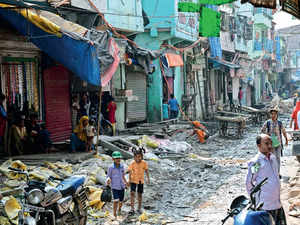
In Maharashtra, the numbers have crossed 700 this year, a significant jump from just 92 a year ago, with Mumbai alone reporting over 300 cases and 10 deaths. The Union health ministry sent teams to Ranchi, Ahmedabad and Malappuram to take stock of the situation and has advised state governments to administer an additional dose of the measles-rubella vaccine to stem the outbreak. Affected states have mounted “mop-up” or “catch-up” campaigns to vaccinate children who missed their doses during the last two years, like Mumbai’s civic body which launched a special vaccination drive from December 1. “We don’t have that many large cohorts of unvaccinated children for it to spread very fast. But wherever there are pockets of unvaccinated children, risks are higher,” says Dr Giridhara R Babu, professor and head, life course epidemiology, Public Health Foundation of India.
MISSED DOSE
The spread of measles in states is in many ways the chronicle of an outbreak foretold. From the time Covid-19 began spreading across the world and countries scrambled to protect their population — first through lockdowns and isolation and then through unprecedented, large-scale vaccination drives — public health experts warned that there would be a price to pay in the form of children missing their regular vaccination doses against diseases like measles, polio and diphtheria. This, they said, could lead to vaccine-preventable diseases (VPDs) once again spreading among the unimmunised, which is precisely how it is playing out across the world.
The WHO recently said that in 2021, close to 40 million children missed a measles vaccine dose, a record number. “The paradox of the pandemic is that while vaccines against Covid-19 were developed in record time and deployed in the largest vaccination campaign in history, routine immunisation programmes were badly disrupted, and millions of kids missed out on life-saving vaccinations against deadly diseases like measles,” WHO Director-General Dr Tedros Adhanom Ghebreyesus said in the statement.

“India has an excellent immunisation programme and it has made extraordinary strides in increasing coverage. The Covid-19 pandemic disrupted this and exposed weaknesses in the vaccination system,” says Dr Mira Johri, professor, School of Public Health, University of Montreal, and co-author of the Lancet paper “Progress in Reaching Unvaccinated Children in India, 1992-2016”. It also contributed to a rise in malnutrition and poverty, she adds. “This is a dangerous confluence of risks.”
Global deaths due to measles, which spreads through direct contact and the air, had come down by over 70% to 142,000 a year by 2018 due to vaccination. But over 95% of measles deaths, says WHO, “occur in countries with low per capita incomes and weak health infrastructures”. While most infected children recover, WHO says cases of severe measles “is more likely among poorly nourished young children, especially those with insufficient Vitamin A”. With India currently the country with the largest number of cases, Dr Johri says it is important to increase public awareness, surveillance and vaccination efforts, to quickly increase population coverage levels. The socio-economic dimensions of the outbreaks and deaths also need to be analysed since those who are susceptible are often members of the weaker segments of society, and action should be taken accordingly.
KEEPING A CLOSE WATCH
With Union and state health ministries swinging into action with mop-up campaigns and awareness programmes, public health experts are hopeful the outbreaks will soon come under control. Measles cases are not expected to get out of hand with massive spikes, Luigi d’Aquino, chief of health, UNICEF India, told ET over email. “There are certain hot spots of measles infection, exacerbated by the pandemic through missing vaccine doses, which are reporting cases now. However, states and the national government have put in measures to identify such areas and move rapidly in case of any risk factors.” India’s considerable experience in mop-up campaigns to tackle infectious diseases would help it tide over the current outbreaks, says Dr Babu. “We have micro plans and mechanisms, we just need to roll them out in a coordinated manner in every state. Then we will be able to bring it under control.”
On the question of whether there might be outbreaks of other VPDs, D’Aquino says there is no indication to suggest any additional risk, particularly as other diseases are not as contagious as measles. But Dr Babu says India should be ramping up its surveillance of other VPDs. There is a welldefined surveillance programme for measles but this mechanism is not available for all VPDs, and we should be looking closely at the “silent” areas that are not reporting anything, he says. “Whether we have outbreaks or not, we should be strengthening the surveillance of VPDs on a war footing — that’s the only way we can take corrective action,” he says.
As countries across the globe face similar challenges, it is imperative to take action to remedy the impact the pandemic has had on immunisation efforts. “No one can predict the future, but we can, by our actions, shape a better future,” says Dr Johri.
Read More News on
Download The Economic Times News App to get Daily Market Updates & Live Business News.
Read More News on
Download The Economic Times News App to get Daily Market Updates & Live Business News.









 Get Unlimited Access to The Economic Times
Get Unlimited Access to The Economic Times
